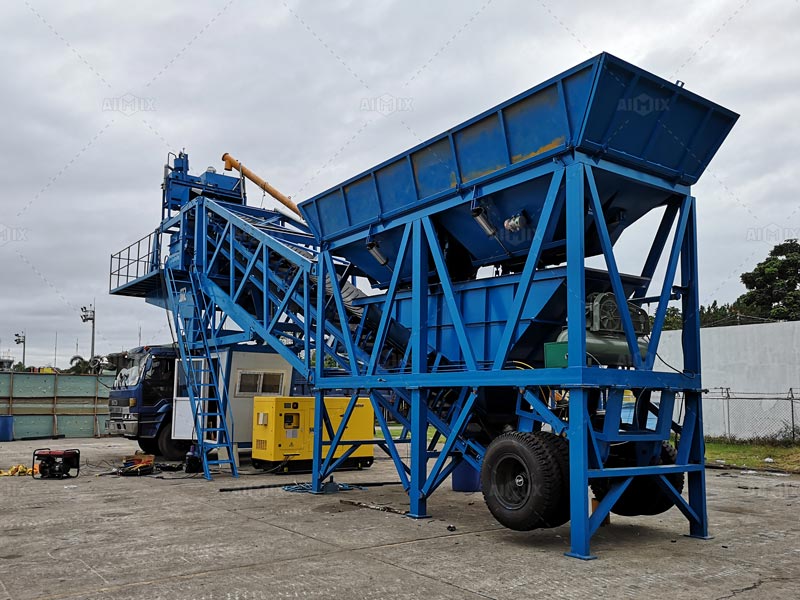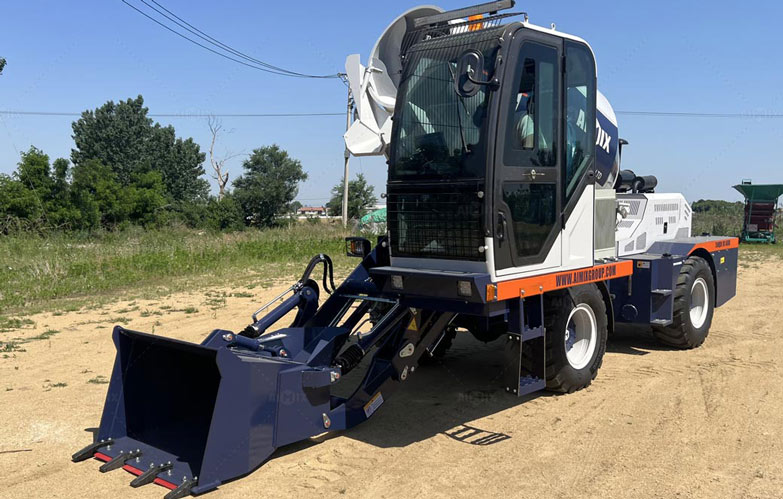Concrete production has evolved with the introduction of mobile concrete plants and self-loading concrete mixers. Both of these technologies offer significant advantages in terms of flexibility, efficiency, and cost-effectiveness. However, choosing the right equipment for a specific project can be challenging. In this article, we will compare mobile concrete plants and self-loading concrete mixers, highlighting their features, ideal uses, and differences to help you make an informed decision for your construction needs.

What Is a Mobile Concrete Plant?
A mobile concrete plant is a portable, compact plant that can be moved easily between construction sites. It allows for the production of large volumes of concrete on-site, ensuring that projects get the materials they need on time. Mobile concrete plants(Planta de concreto movil) are highly versatile and often used for large projects or projects that require high mobility.
Advantages of Mobile Concrete Plants
- Portability: One of the biggest advantages of mobile concrete plants is their mobility. They can be easily transported from one location to another, reducing transportation costs and increasing flexibility in project scheduling.
- High Production Capacity: Mobile concrete plants are capable of producing large quantities of concrete quickly, making them ideal for large-scale projects such as road construction or large commercial buildings.
- Space-Efficiency: These plants are designed to take up less space on-site, making them perfect for projects with limited space.
- Easy Setup: Mobile concrete plants are designed for easy and fast setup, allowing for quicker project start times and reduced downtime.
Applications of Mobile Concrete Plants
Mobile concrete plants are well-suited for large construction projects that require consistent and high-volume concrete production. They are often used in:
- Road construction
- Bridges and tunnels
- High-rise buildings
- Infrastructure projects in remote or hard-to-reach locations

What Is a Self-Loading Concrete Mixer?
A self-loading concrete mixer is a type of mobile concrete mixer that combines the functionality of a concrete mixer with an automatic loading feature. It is equipped with a drum that rotates and mixes the concrete while also having a mechanism to load the ingredients directly into the drum. These machines are often smaller in size than mobile concrete plants and are used for projects with lower concrete volume requirements.
Advantages of Self-Loading Concrete Mixers
- Compact and Flexible: Self-loading concrete mixers are smaller and more compact compared to mobile concrete plants and mini concrete plants(mini planta de concreto). This makes them ideal for smaller projects where space and transportation access may be limited.
- On-Demand Mixing: The ability to mix concrete directly on-site allows for fresh, customized mixes without the need for pre-mixed concrete. This is ideal for projects with specific concrete requirements.
- Labor Efficiency: These mixers reduce the need for additional labor to load and mix the concrete. The operator can load and mix the ingredients with minimal effort, saving time and reducing labor costs.
- Cost-Effective for Small Projects: Self-loading concrete mixers are an excellent choice for smaller-scale projects or projects with lower concrete volume needs due to their relatively low cost compared to larger mobile concrete plants.
Applications of Self-Loading Concrete Mixers
Self-loading concrete mixers are particularly useful for small to medium-sized projects where mobility and flexibility are key. They are commonly used in:
- Residential building projects
- Road repairs and maintenance
- Small-scale infrastructure projects
- Landscaping and civil engineering work
Key Differences Between Mobile Concrete Plants and Self-Loading Concrete Mixers
While both mobile concrete plants and self-loading concrete mixers are essential equipment for the construction industry, they are suited to different project requirements. Below is a breakdown of the key differences:
1. Production Capacity
Mobile concrete plants have a much higher production capacity compared to self-loading concrete mixers. They are designed to produce large quantities of concrete at once, making them ideal for large-scale projects. On the other hand, self-loading concrete mixers are better suited for smaller-scale operations due to their limited production capacity.
2. Portability and Setup
Both machines are portable, but mobile concrete plants are generally more complex to transport and set up. They require a larger setup area and are usually transported to larger construction sites. Self-loading concrete mixers, on the other hand, are more compact and easier to maneuver around tight spaces and smaller projects.
3. Cost
Mobile concrete plants typically have a higher upfront cost due to their larger production capacity and more advanced technology. However, they are more cost-effective for large-scale operations. In contrast, self-loading concrete mixers have a lower initial cost and are more cost-effective for smaller projects or those with a limited budget.
4. Flexibility
Self-loading concrete mixers offer greater flexibility when it comes to small projects or remote locations. They can be used on-site to mix concrete as needed, without relying on a centralized concrete plant(planta de concreto peru). Mobile concrete plants, while highly versatile, are better suited for larger projects where consistent concrete supply is required over an extended period.
5. Maintenance and Operational Costs
In terms of maintenance, mobile concrete plants tend to require more frequent upkeep due to their complexity and the larger number of moving parts. Self-loading concrete mixers are generally easier to maintain, and their smaller size makes them more cost-effective to run.
Which One Should You Choose?
The choice between a mobile concrete plant and a self-loading concrete mixer in AIMIX depends on the scope and scale of your project. If you’re working on a large construction site with high concrete demand and need efficient production, a mobile concrete plant is the better option. It is capable of delivering large quantities of concrete quickly and consistently.
For smaller-scale projects, residential buildings, or projects that require high mobility and flexibility, a self-loading concrete mixer is an excellent choice. It is compact, cost-effective, and offers great versatility for on-site mixing of smaller volumes of concrete.
Conclusion
In summary, both mobile concrete plants and self-loading concrete mixers serve vital roles in modern construction. Your choice will depend on the project’s size, budget, and specific requirements. By understanding the advantages, capacities, and limitations of each, you can select the right equipment that best meets your needs and ensures a successful and efficient project completion.